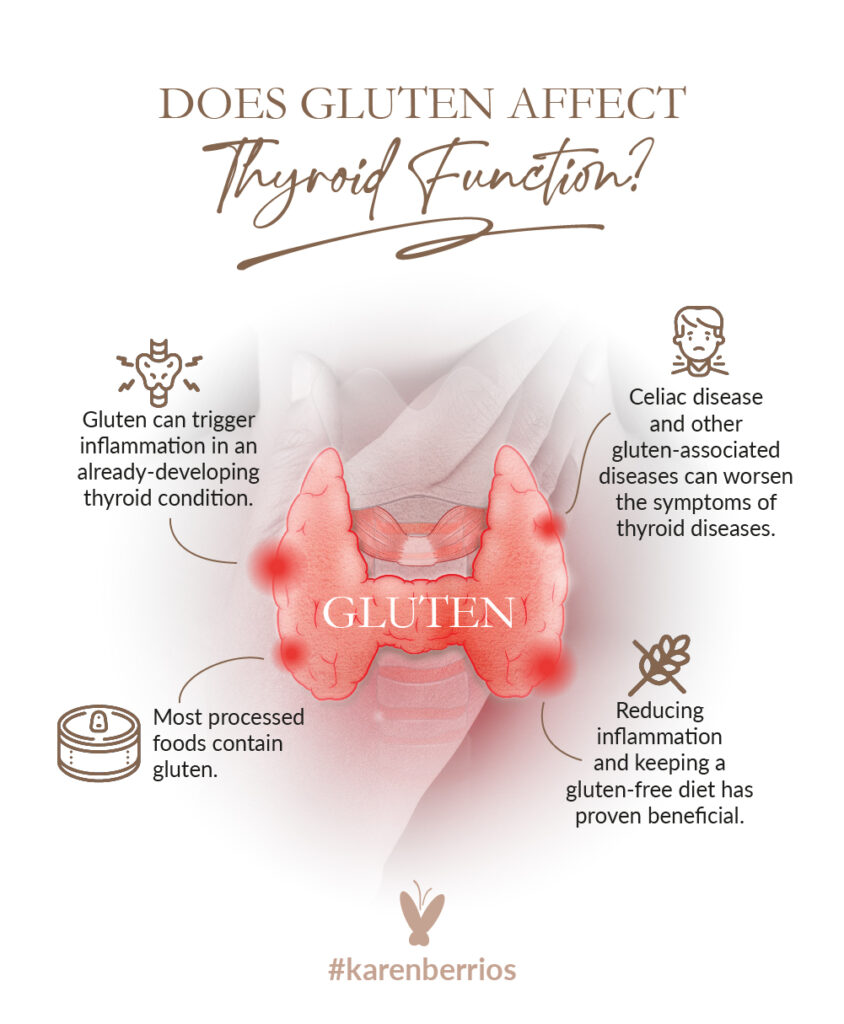

Does Gluten Affect Thyroid Function?
Gluten Affect Thyroid Function?. The thyroid is one of the most important glands in the human body as it performs a lot of functions that are crucial for your overall health and wellbeing. And when your thyroid gets inflamed or you develop a disease like I did, there are a lot of factors that could have contributed to its impaired function, as well as exacerbate it even further down the line.
Gluten is one of the main pro-inflammatory compounds in our current diet and it’s an underlying factor of many diseases and metabolic disorders, from celiac disease and IBS to asthma and colon cancer. But does it affect thyroid function? And if so, to what extent?
What is Gluten Anyway?
Gluten is a name for a group of proteins found in wheat, barley, triticale, and rye, and it helps thicken and improve the texture of food, promoting moisture retention and acting like a glue that holds everything together. That’s why you can find it in many processed foods, dressings, sauces, and other products which you might be very surprised by.
Gluten-free diets and products have become increasingly popular in the last decade, mostly due to the growing number of cases with gluten-related issues. And even though that might sound like a great thing, just like with everything else, the fact something is labeled gluten-free doesn’t necessarily mean it’s healthy and free of artificial additives, sugar, and highly-processed ingredients.
Certain medical conditions require keeping a gluten-free diet as the ones suffering from them cannot tolerate gluten and in response, trigger a reaction of the immune system, attacking healthy cells and developing an autoimmune disease. The most common include:
- Celiac disease – a chronic autoimmune disorder that damages the small intestine, causing malnutrition and malabsorption. The trigger is gluten, and since there’s no cure, the only solution for relieving the unpleasant symptoms is to eliminate it from your diet and maintain a gluten-free diet for life.
- Non-celiac gluten sensitivity (NCGS) – although still a pretty unknown disease, this disorder gets triggered by gluten, but doesn’t test positive for celiac disease.
- Irritable bowel syndrome (IBS) – it’s still unclear how and why exactly gluten causes IBS to flare up, but there’s a connection and those keeping a gluten-free diet do feel better and experience fewer symptoms.
On the other hand, following the trend, many people have jumped on board and started eliminating gluten from their diets even without any diagnosis or medical reason. And even though research points out that for most people, gluten does not pose a serious health risk, those who are on a gluten-free diet report feeling much better, with increased energy levels, improved sleep, and overall better life quality.
The Thyroid
This butterfly-shaped gland is located on the front of your neck and it’s main role is hormone secretion. The main hormones, thyroxine and triiodothyronine, also known as T4 and T3, as well as TSH (the thyroid stimulating hormone) influence your metabolism, impact growth and development, and play a part in controlling your body temperature. They’re also crucial for brain development in infants and young children.
When these hormones are out of balance, a variety of different issues can occur, leading to inflammation and a development of thyroid disorders.
Thyroid Conditions
Some of the most common thyroid disorders and diseases include:
- Thyroiditis – inflammation and swelling of the thyroid gland, either due to a viral infection or autoimmune disease
- Hyperthyroidism – an overproduction of the thyroid hormones, most commonly caused by Graves’ disease
- Hypothyroidism – low production of the thyroid hormones, mostly caused by an autoimmune thyroid disease called Hashimoto’s thyroiditis
- Thyroid cancer – which was unfortunately, my diagnosis
Depending on the condition, all thyroid diseases are treated in a different way, but they’re all affected by diet and nutrition.

Gluten and The Thyroid Gland
As we truly are what we eat, it’s important to acknowledge and recognize the link between certain foods and our health, no matter which area of the body we’re focusing on. Still, when the foods impact very important parts or organs which can have a massive influence on the body as a whole, that’s when fine tuning what we decide to put on our plate becomes extremely important.
Foods that generally have a negative influence on the thyroid, and our overall health include:
- Ultra-processed foods
- GMO
- Sugar
- Trans fats
- Highly-processed oils
- Artificial fillers, binders, dyes, additives
- Sugary drinks
- Excess salt
- Hormone-treated animal products
- Bleached and highly-processed wheat and other grains
Even though this list contains no surprises, it’s the white bread, pasta, oats, and other processed foods containing a myriad of ingredients that usually contain gluten, thus negatively impacting your thyroid.
Furthermore, studies show that if you have Hashimoto’s thyroiditis, which classifies as an autoimmune thyroid disease, gluten can trigger inflammation, leading to more severe symptoms and gut dysbiosis. Keeping a gluten-free diet has proven beneficial in keeping inflammation at bay, but it’s not a miracle fix. There’s more to eliminate from your diet, like the aforementioned ultra-processed foods and sugar to really have a significant impact on your thyroid disease.
If you’re also experiencing celiac disease, you’re basically fighting two autoimmune conditions at the same time, attacking your own cells and healthy tissue. This is where keeping a gluten-free diet is crucial to lower inflammation and prevent more severe complications down the road.
Gluten is also mostly found in ultra-processed foods as it acts as a thickening agent, and since these are the types of food you should eliminate no matter what your health journey looks like, eliminating gluten comes as a welcoming consequence.
Foods to Support Thyroid Health
If you’re struggling with figuring out how to live without gluten, don’t despair. I’ve been down that road. The best thing you can do is stop trying to replace gluten-rich foods and focus on adding a variety of healthy, nutritious foods and superfoods which will help you heal, lower inflammation, protect the cells and tissue from pathogens, support your immune system, and help improve the health of your thyroid.
The majority of these foods can be found in the plant world, and that’s why I’ve shifted my diet to meet this approach, focusing on the powerful healing properties of herbs, fruit, vegetables, beans, and legumes. They are filled with vitamins, minerals, antioxidants, and fiber, helping your body thrive and flush out toxins more efficiently. They also help you fight free radicals, protect against cellular damage, and strengthen your immune system, boosting your fight against bacteria, viruses, and other intruders.
Final Thoughts
Even though gluten alone isn’t the culprit for developing a specific thyroid disease, it can furthermore exacerbate its symptoms and trigger inflammation. When you’re in the process of healing, you’re working on a much larger picture, a picture of your entire body and mind.
So, whatever causes inflammation and more work for your immune system, it’s best to get rid of it. That’s why eliminating gluten from your diet can only be beneficial, for the health of your thyroid, and your entire wellbeing. Focus on whole, nutritious foods instead, and make them a priority in your daily diet.

hey there
I'm Karen!
I have found my cancer journey to be a positive and profound transformational experience. I’m inspired to share my healing journey here, and trust you’ll find hope, encouragement and purpose as you discover the healing power that lies within you.
Join
The Mailing List!
By signing up for my newsletter, you agree with our Privacy Policy and Terms & Conditions.


